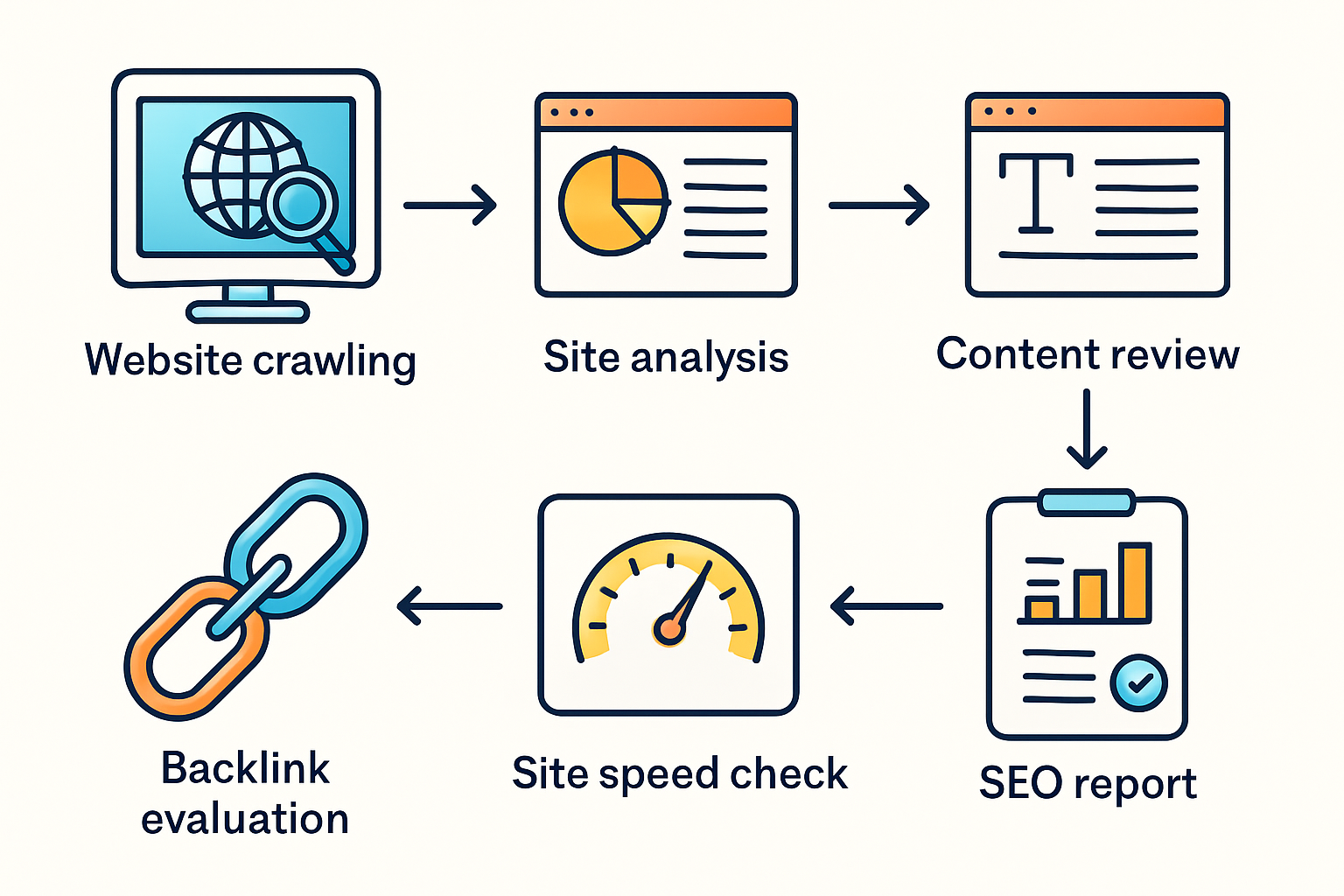What is an SEO Audit and Why Your Site Needs One?


SEO audits are absolutely essential for anyone serious about boosting their website’s performance. They give you a clear, no-nonsense snapshot of how your site stacks up in search engines and highlight areas that could use a little polish.
This article takes a good hard look at what an SEO audit really is by laying out its purpose and benefits and explaining how the process unfolds.
What Exactly Is an SEO Audit?
An SEO audit acts like a thorough health check for your website. It dives deep into how well your site is doing in the world of search engine optimization.
This evaluation dives into a handful of vital areas: the technical setup, how well the content performs and external factors like backlinks.
- Technical SEO is all about making sure your site’s easy for search engines to find and navigate. It is like giving them a well-marked map instead of sending them on a wild goose chase.
- On-page SEO focuses on tweaking each page with just the right keywords and content, much like seasoning a dish to bring out the best flavors.
- Off-page SEO looks beyond your own backyard by weighing backlinks and how your site’s reputation spreads across the web.
- User experience dives into how visitors actually interact with your site because if it feels clunky, people will not stick around.
- Content quality keeps an eye on how original and relevant your info is, making sure you’re not just noise in a sea of sameness.
- Site speed measures how quickly your pages load since every millisecond counts these days to keep individuals from clicking away.
- Mobile-friendliness ensures your site performs well on all sorts of devices because nobody wants to wrestle with a squished screen on their phone.
- Backlinks evaluate incoming links that boost your site’s authority and act like trusted recommendations in the vast online world.
Why Bother Conducting an SEO Audit?
Many websites tend to face sneaky little issues that quietly chip away at their search visibility. Without rolling up their sleeves and diving into a detailed SEO audit, site owners might just miss those important problems holding back their traffic growth.
- Spot and fix those pesky technical hiccups that can throw a wrench in search engines crawling your site.
- Spruce up the user experience so visitors stick around longer instead of bouncing away in a flash.
- Speed things up to keep both your users and search engines happy—that slow loading page just won’t cut it anymore.
- Regularly refresh and fine-tune your content to really match what users are after and keep up with the latest search trends.
- Build a stronger backlink profile by hunting down quality links and wisely cutting out the ones that might do more harm than good.
- Keep a close watch on your competitors to get the scoop on their SEO moves.
- Stick to Google’s guidelines like your SEO life depends on it—because penalties are a headache nobody wants.
Regularly performing SEO audits is like giving your website a regular checkup to keep it in tip-top shape over time. Whenever you update the site or tweak the content, or when Google changes its algorithm, these audits usually catch pesky technical glitches or content slip-ups before they cause sudden traffic drops.
Wrangling the SEO Audit Process and What You Really Need to Know
SEO audits follow a pretty straightforward, step-by-step process that carefully digs into your website’s structure and checks how well it’s performing.
Use SEO tools to crawl your website and find broken links, errors or duplicate pages.
Examine your site's structure and indexing to ensure search engines can access all your content easily.
Check each page’s content and keywords to see if they match your target search terms.
Test site speed and mobile usability to guarantee a smooth experience on any device.
Review your backlinks carefully for quality, relevance and spammy links that might harm you.
Analyze user engagement metrics like bounce rate and click paths to understand how people interact with your site.
Wrap up by gathering findings into a clear actionable report with recommendations you can use to improve your site.
Each step uncovers valuable insights that might otherwise slip through the cracks. Regularly crawling your site reveals broken internal links or missing pages—those little gremlins that frustrate both your visitors and search engines. Taking a good look at backlinks helps you spot troublemakers—harmful links that could land you in hot water with penalties. Meanwhile, content analysis ensures your pages hit the right keywords and not just throw darts blindfolded.

Flowchart illustrating the key steps involved in an SEO audit process.
Technical SEO The Essential Foundation for Keeping Your Site in Tip-Top Shape
Technical SEO is all about the behind-the-scenes magic that helps search engines crawl and index your site and truly understand it without breaking a sweat.
- Double-checking your XML sitemap to make sure it’s complete and up to date, because a missing page can be a sneaky little troublemaker.
- Making sure the robots.txt file is properly set up to kindly guide search engine crawlers without stepping on any toes.
- Adding canonical tags like a pro to dodge those pesky duplicate content problems that can throw a wrench in your rankings.
- Using HTTPS not just to keep your site locked down tight but also to build that all-important trust with your visitors.
- Organizing URLs clearly so they make sense to both humans and search engines alike—because clarity never goes out of style.
- Keeping a vigilant eye on 404 errors and setting up the right redirects to give lost visitors a helpful nudge back on track.
- Hunting down and fixing duplicate content issues across your pages, because no one likes seeing the same thing twice.
- Making sure your site shines on mobile devices too, keeping pace with how individuals actually browse these days.
Overlooking these nitty-gritty technical details can trip up your rankings even if your content is top-notch. Think of technical SEO as the behind-the-scenes crew that helps search engines find and properly rank your site.
Giving Every Single Page Its Moment to Shine with On-Page SEO
On-page SEO is all about fine-tuning the content and HTML bits of each webpage. It helps search engines get the gist of what the page is really about and link it up with the right user searches.
- Craft titles that are descriptive and packed with well-chosen keywords to catch clicks.
- Write meta descriptions that summarize your page content while staying engaging.
- Use header tags like H1 and H2 to organize your content and make it easier to read.
- Make sure relevant keywords appear naturally in titles, headers, and throughout the text—no keyword stuffing.
- Keep content original and high-quality, delivering real value that feels authentic.
- Build solid internal links to related pages to help visitors navigate without confusion.
- Include clear descriptive alt text for images to boost both accessibility and SEO because everyone deserves to know what’s what.
These elements team up to help search engines really get the gist of what each page is about and figure out just how relevant it is for specific search queries.
Off-Page SEO How to Build Authority and Trust Without Breaking a Sweat
Off-page SEO is all about how other websites size up your site's reputation and authority. Backlinks—those handy links from other sites pointing to yours—are usually the heavy hitters when it comes to off-page factors, signaling trust and popularity to search engines like a virtual thumbs-up.
An SEO audit takes a close and sometimes nitpicky look at your backlink profile by sizing up the quality and relevance of your links while sniffing out any toxic or spammy ones that could sneakily drag your rankings down.
- Counting how many backlinks are pointing to your site. It sometimes feels like counting stars but it’s worth it.
- Evaluating the quality of referring domains by checking their authority and relevance because you want solid friends in this game and not just any old crowd.
- Making sure backlinks naturally tie into your content topics since random links are about as helpful as a screen door on a submarine.
- Keeping an eye on the variety of anchor text to make your linking profile look natural and not like you’re shouting the same phrase over and over.
- Hunting down and disavowing those pesky harmful or spammy links that could sneakily mess with your rankings. We wish they’d just disappear on their own but that rarely happens.
User Experience and Website Performance—Getting It Just Right
User experience (UX) has really stepped into the spotlight as a key player for search engines in ranking sites by focusing on how visitors interact with your website. An SEO audit examines how easy your site is to navigate, how quickly it loads, and how well it performs across devices
- Measuring how long pages take to load, aiming to shave off those pesky seconds that can feel like forever to visitors.
- Testing how the site works on smartphones and tablets, making sure it’s as smooth and easy to use as your favorite app.
- Reviewing the navigation setup to ensure browsing feels natural and straightforward, like a well-marked trail that just makes sense.
- Checking accessibility features to support users with different needs, because everyone deserves a seamless experience.
- Keeping a close eye on bounce rates to catch any red flags with content or user experience before they spiral.
- Looking at engagement metrics like time spent on the site and number of page views, so we know what’s really holding people’s attention.
Improving these elements not only gives search engines a high-five but also makes life easier for your users by creating a much smoother browsing experience.
Popular Tools and Resources for SEO Audits (Because Who Doesn’t Love a Good Toolkit?)
There are quite a few reliable tools out there that really take the headache out of the SEO audit process by automatically scanning your website and zeroing in on the issues that truly need your attention.
- Google Search Console is your go-to, giving you free insights into how your site is indexed and flagging any crawl errors that might be lurking in the shadows.
- Screaming Frog SEO Spider acts like a mini search engine, crawling your site to uncover those pesky technical issues that can slip under the radar.
- Ahrefs Site Audit dives deep, offering a thorough analysis of your backlinks and the overall health of your site. It’s like a wellness check, but for your website.
- SEMrush Audit spots SEO hiccups and lays out solutions on a user-friendly dashboard, making it easier than ever to tackle those problems head-on.
- Moz Pro delivers detailed site audits along with practical tips to fine-tune your keywords and content, kind of like having a savvy SEO coach in your corner.
- PageSpeed Insights takes a look at how fast your pages load and serves up suggestions to speed things along, because nobody likes waiting around.
Each tool brings its own strengths that cater to different audit needs. Semrush’s Site Audit is well-loved for its deep technical checks and savvy backlink tracking and is a go-to for pros who rely on detailed data-driven insights. Moz Pro mixes things up by combining solid site audits with helpful content optimization tips. This adds a nice touch for those who want more guidance. Meanwhile, Mangools keeps it simple and user-friendly. It is perfect if you’re just starting out and need straightforward keyword and backlink analysis without bells and whistles.
How Often Should You Really Be Doing an SEO Audit?
There isn’t a one-size-fits-all answer when it comes to how often you should audit your site. It really boils down to a few things: how big your site is, how often you update it and how cutthroat your competition is. Running an audit at least twice a year usually does the trick and helps you spot problems before they snowball.
- When you make significant site changes or redesign, it is usually smart to run a fresh audit to catch any sneaky issues that might pop up.
- Google's algorithm updates tend to shake things up so it is a good idea to tweak your strategy accordingly.
- Shifts in your market or competitors can throw new SEO opportunities your way and are worth keeping an eye on.
- As your content or product lineup grows, it is wise to double-check if your keywords and site structure still line up to keep everything humming along smoothly.
Larger or fast-growing websites often need audits every quarter or sometimes every month to keep things running smoothly and stay ahead in the ever-shifting digital landscape.
Moving Beyond the SEO Audit Checklist
An SEO audit is only as good as the follow-through it inspires. By zooming in on fixes that pack the biggest punch for the least amount of sweat, you can smartly focus on improvements that really boost your site’s search visibility.
Take a thorough look at the entire audit report to grasp all the issues that have popped up.
Sort the problems based on how urgent and impactful they are and tackle the critical ones first.
Jump on technical SEO issues like broken links, sitemap hiccups and sluggish loading times as soon as you can. These little gremlins can cause big headaches.
Give your on-page SEO some TLC by refreshing content, sprucing up metadata and fine-tuning your keyword targeting to make it sing.
Say goodbye to harmful backlinks and work on gaining fresh high-quality links that really matter.
Keep a close watch on your site’s performance and run follow-up audits whenever necessary to see how far you’ve come.
Applying audit recommendations consistently while regularly tracking and updating your site is absolutely key to long-term SEO success. I’ve found that this proactive approach helps keep your site not just healthy, but also visible and competitive in those ever-changing search results.
"> An SEO audit is a bit like giving your website a thorough checkup. It digs up those sneaky issues lurking under the surface, helps keep your site running smoothly, and slowly but surely boosts its performance over time."
Unleash Your SEO Prowess with Semrush
Are you struggling to boost your online visibility and drive more traffic to your website? Semrush is the ultimate SEO and digital marketing tool that can take your Internet Marketing game to new heights. With its powerful suite of features, you can gain a comprehensive understanding of your market, optimize your content, and outrank your competitors.
- Uncover Profitable Keywords with Advanced Research
- Analyze Your Site's Health with Detailed Audits
- Monitor Backlinks and Stay Ahead of Competitors
- Streamline Content Creation with Insights and Trends








